“We’ll Always Have Paris”
Written by Deborah Dean Davis & Hannah Louise Shearer
Directed by Robert Becker
Season 1, Episode 23
Production episode 40271-124
Original air date: May 2, 1988
Stardate: 41697.9
Captain’s Log: Picard fences with Lieutenant Dean so Sir Patrick Stewart can show off all those fencing skills he picked up doing stage swordfights with the RSC. A moment in time repeats itself all across the ship. The Enterprise receives an automated distress call from Dr. Paul Mannheim on Pegos Minor. Picard recognizes the name, and explains to Riker that he was last known to be doing experiments with non-linear time.
The Enterprise responds to the distress call. Data explains that Mannheim was considered a visionary, particularly with regards to his theories regarding the relationship between time and gravity, but his theories never achieved widespread acceptance—because it’s a TV show, and TV show scientists are always eccentrics who never achieve widespread acceptance.
Troi notices Picard’s strong emotions at the sound of Mannheim’s voice and suggests he deal with those emotions before they arrive. Picard goes to the holodeck and re-creates the Café des Artistes as it was twenty-two years earlier, when he got cold feet for a rendezvous with someone.
Another ship and a farming colony report the same time repetition, while the Enterprise follows the distress signal to a relay in Pegos Minor and that leads them to the Vandor system.
Mannheim is having convulsions, and he and his wife beam aboard—the wife being Jenice, who eventually is revealed to be the rendezvous he couldn’t make at the Café des Artistes.
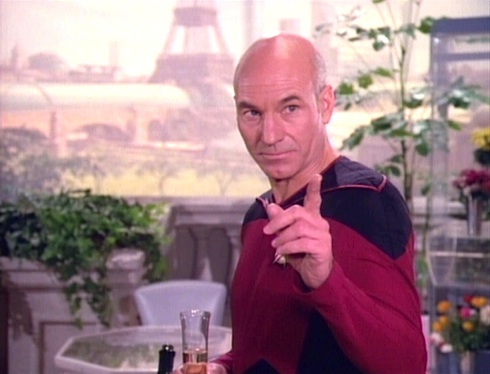
The time repetitions start happening again, which Data calls “the Mannheim Effect,” because these things need fancy-shmancy names, despite the fact that the term is never used again. Jenice explains that the rest of the team was killed in an accident.
Mannheim awakens and he says that he touched another dimension. His mind is still partly there, and he’s having trouble focusing. He had no idea the time distortion effects went beyond Vandor, and he urges Picard to shut it down. He provides the crew with the codes they need to do so.
Data beams down alone and is able to use antimatter to plug the gateway to the other dimension. As an added bonus, this cures Mannheim. He intends to continue his work, and the Mannheims beam back down.
Thank You, Counselor Obvious: Troi actually gets to do her job twice over, giving Picard good advice and attempting to help Crusher deal with her unresolved feelings toward Picard.
Can’t We Just Reverse the Polarity?: “There seems to be some kind of strange bouncing effect.” Transporter Chief Herbert with the hardcore science terminology.
Mannheim also gets a wonderful line when informed that Data is fully versed in his theories: “How is that possible? Even I am not fully versed in my theories.”
If I Only Had a Brain…: Data rejects the notion of the time repetition as a hiccup, as a different body function would be more appropriate. Picard interrupts him before he can specify whether or not it’s a fart or a belch. Picard also trusts Data to solve the problem himself, since he sees time as a constant and is less affected by the distortion.
He also uses a contraction at the climax when he proclaims, “It’s me!”
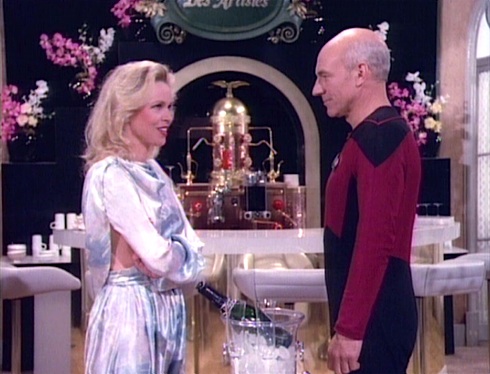
What Happens on the Holodeck Stays on the Holodeck: Picard re-creates the Café des Artistes in Paris, which, like all locations in Paris, has a perfect view of the Eiffel Tower. Picard brings Jenice there at the end so he can finally make their date—and say a proper goodbye—before she goes off with her husband.
No Sex, Please, We’re Starfleet: Jenice and Picard were an item twenty-two years earlier, but he chickened out of a date and shipped off, presumably on the Stargazer. The two have smoldering chemistry and Stewart in particular beautifully plays Picard’s regrets for what might have been.
Crusher, meanwhile, shows remarkable perspicacity with regards to Picard’s feelings as well as her own—politely declining Troi’s assistance.
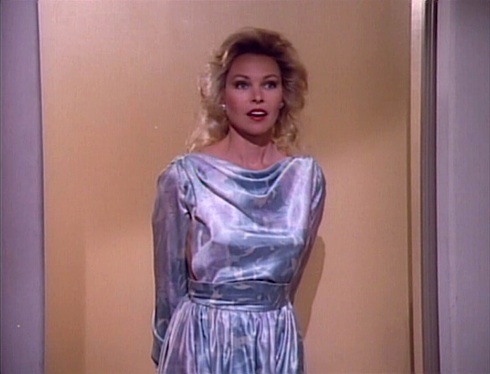
Welcome Aboard: The primary reason why anybody cares about this episode is that Michele Phillips, late of the Mamas and the Papas, plays Jenice, and she is incredibly radiant.
I Believe I Said That: “Are you all right?”
“Why wouldn’t I be? I’ve got one of the medical wonders of the galaxy dying in my sickbay.”
Troi trying to help Crusher, and Crusher snarking.
Trivial Matters: Besides the title and the similarity of the love triangle, the episode makes an additional Casablanca reference by Picard, Riker, and Troi talking about going to the Blue Parrott Café, which was the name of Signor Ferrari’s place in the movie. A certain author also set a scene in the Blue Parrott in his novel A Time for War, a Time for Peace (cough cough).
Deep Space Nine would later do their own Casablanca riff in the episode “Profit and Loss.”
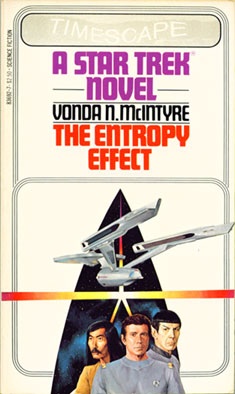 This episode’s plot also bears some similarities to Vonda N. McIntryre’s novel The Entropy Effect—woman from captain’s past, bearded scientist playing with time, the emotionless, scientifically minded character solving the problem, but by “patching” the time distortion rather than fixing it, and so on.
This episode’s plot also bears some similarities to Vonda N. McIntryre’s novel The Entropy Effect—woman from captain’s past, bearded scientist playing with time, the emotionless, scientifically minded character solving the problem, but by “patching” the time distortion rather than fixing it, and so on.
Make it So: “Nothing works as you hoped.” There’s nothing I can point to at this episode and say is wrong, but it’s one of the more forgettable episodes, honestly. It’s an interesting look into Picard’s past, and how much of an emotional coward he was as a youth, and Stewart and Phillips have magnificent chemistry, but the episode itself is kind of nowhere. The time jumps are minor and provide no sense of menace or danger—indeed, the entire episode is remarkably bereft of suspense or consequences. The result is a disappointingly flat, empty story that’s good for a few cutesy scenes between Picard and Jenice and not a helluva lot else.
Warp factor rating: 4.
Keith R.A. DeCandido has written a great deal of Star Trek fiction, including the Picard-focused short story “Four Lights” in The Sky’s the Limit, the Picard-focused comic book miniseries Perchance to Dream, and the novel Q & A, a post-Nemesis which features Picard and Crusher after they finally decided to become a couple. His more recent novels are Unicorn Precinct, SCPD: The Case of the Claw, and the upcoming Guilt in Innocence, part of the Scattered Earth shared-world science fiction series. Go to Keith’s web site, which is a gateway to his blog, Facebook, and Twitter.










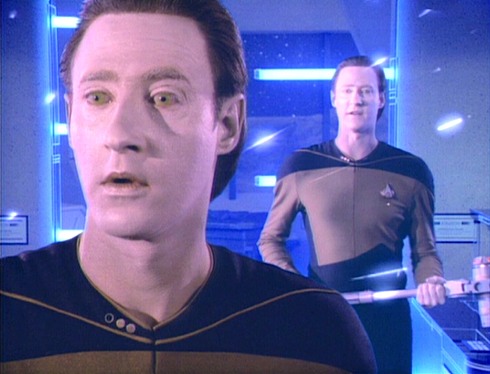
I remember thinking that it was patently absurd that something like the time skips depicted could be possible in a universe as dense with intelligent life as ST, because even if it’s incredibly difficult/expensive/rare/whatever, you have to figure somebody’s going to replicate this accident’s effects every few centuries or so, and there’s no record of anything so momentously obvious occuring in the historical record.
I am officially going to hunt down that book, just for that picture of Sulu..
Magentawolf: In my not-very-humble opinion, The Entropy Effect — which was the first original novel published by Simon & Schuster when they took over the Star Trek license from Bantam following the first movie — is one of the best Trek novels ever written. I strongly recommend it.
—Keith R.A. DeCandido
Really, the episode wasn’t sloppily made, and the vignettes were memorable. I think it’s possible that the writers knitted a few fifteen minute ideas together into a 45 minute whole, but they didn’t drop any stitches, so it works out just fine. I do tend to remember scenes from this episode even though I’ve not watched it in ages (the disc isn’t at the top of the pile , probably because it includes Yar’s death). I think that if I remember one episode out of a seven years series that ran over twenty years ago, that speaks pretty well for it.
I think the importance of this episode *does* lie in the love story rather than the quantum event (which is a great excuse to recreate a scene from Carl Sagan’s Cosmos), but that’s not a bad thing. This is the first building block in the tale of Picard’s callow youth, something that gets expanded and constructed all the way through the movies. Is he running from the stability and responsibility of home life? Is he building something greater than himself, or is that just what he tells himself while he lives in a house of cards? By the conclusion of the last movie, Picard’s last blood relative is dead, and so is Data. The captain has gone from avoiding all emotional entanglements to accepting the consequences of relationships – the inevitable grief of death, for example. The vineyard is gone, and his comrades are gone, but they all mattered to Picard, and so they will indirectly matter to someone else – lots of someones as he keeps moving through the galaxy. I guess you could call that imperialism, but I think it’s just sort of social chaos theory – when a butterfly flaps its wings in France, a chaotic nanovirus eventually gets unleashed in a Borg cube.
I don’t think data was going to say burp or fart…
I don’t think it’s until season four’s Family that they truly got the hang of these “change of pace” episodes. As in, making it feel like an important episode instead of filler.
Keith, when you mentioned novel tie-ins, you left out my Department of Temporal Investigations: Watching the Clock, which revisits the Manheim Effect and the events of this episode. It took some effort to make some kind of sense out of the rather sparse and random technobabble in this episode.
This episode was also one of my main justifications for establishing in The Buried Age that Picard and Troi had known each other before TNG. Here, she mentions to Picard that he tends to suppress deep personal issues, but prior to this point in the series, we’ve never seen him deal with a deep personal issue aside from his baggage with the Crushers. So it stands to reason that she knew that about him because they have a history together.
The reason for Data’s contraction at the climax is that the whole thing was basically improvised. The ’88 writers’ strike had kicked in during production of this episode, so the producers couldn’t do any rewriting of the climactic sequence (which was very different in the original script) and the cast and crew pretty much had to slap something together on their own.
I agree this is a pretty forgettable episode overall. Even the musical score is rather bland, probably my least favorite part of the 14-disc Ron Jones soundtrack set that Film Score Monthly released a while back. As for Michelle Phillips, she was okay but never really caught my fancy. The main reason I have any interest in her is that a college friend of mine who was acting on Broadway for a few years actually played Michelle Phillips in a show about The Mamas and the Papas (although I think the show focused only on one or two members of the group and she was just in a singing role rather than acting).
Christopher: Sorry, I haven’t yet read Watching the Clock, and so was unable to reference it.
—Keith R.A. DeCandido
I came here to find out what Data was really trying to say and found this interesting review.
~
I think that although it was flat, it had one of the best intros of all the other episodes.
Skwid: The only way the time stuff makes sense to me is if it wasn’t universe-wide. Local time phenomena happen all the time in Star Trek. It just extended further than he thought it did.
I mean, we see it getting stronger when Data is next to it, so it must decrease in intensity and fall off to nothing given enough space.
Anyways, I thought this episode deserved a +1 just for the cool effect at the end when Data is fixing everything. That’s basically all I remember about the episode.
So… all their collegues just died, her husband is currently dying in sickbay, and they may have done serious damage to the space-time continuum or whatever, but Jenice spends her time flirting with a guy who stood her up twenty-two years ago? That’s really likely.
@7/Christopher – I couldn’t disagree with you more about Ron Jones’ score for this episode. Yes, I’ll grant much of it is repetitive technomelody (although I find it has a kind of soothing effect on me personally), but his theme for Picard and Janice is absolutely gorgeous. We don’t get to hear long-form themes like that in episodic TV much, and Jones really outdoes himself on that one — not only in its two most prominent appearances in full-on Parisian cafe accordion mode, but also as it softly underscores Picard and Janice’s conversation in the observation lounge. Between that and “Skin of Evil,” that disc is one of my top three favorites from that whole box set.
@@@@@#4 Sihaya, nine years on, your comments are very interesting to read, having just caught up on Picard.
I tend to like the more character-driven episodes of the series, so I rate this a lot higher. “Family” is my favorite Trek episode by far, due to the amazing chemistry Between Stewart and Jeremy Kemp. Here, I really enjoyed Michelle Phillips and Stewart together, although perhaps it’s the HD TV phenomenon at work but that stark white pallor of her makeup was off-putting. Near the end there’s a scene with the two of them and Picard leans up against a bulkhead and smiles at her wistfully, and you can see the nuance of complex feelings across his face. Newsflash- Patrick Stewart really is an astonishingly talented actor.
I’m speed binge-watching for now, so it’s only been a week or so since I rewatched Encounter at Farpoint, and it’s interesting to see how Stewart has grown into the role in just a single season. The captain of the first episode was hesitant and only intermittently sure of himself, and even when he got all huffy with Q it seemed more like he was throwing a tantrum than asserting himself. By now, when Picard is in the frame, you can’t take your eyes off him.
Well, except maybe for that French girl in the cafe at the beginning. A+ costume design right there. Wow.
Riker and Data are hardly bit players, but I want a Rosencrantz and Guildenstern Are Dead version of this episode with them putting voice to the hilarious wide-eyed looks they keep sharing when Picard talks about, or to, his old flame.
I’m glad I wasn’t the only one who found this episode a bit flat. Sure, it’s nice to have more of Picard’s story, but they either should have gone all in for that or showed us more time loopiness. I was hoping one Picard would tell the other Picard to get off his bridge.
What bothers he though is that the experiments are allowed to go on. “You ripped a hole in time and almost killed yourself, but as you were — check in now and again.” It left me shrugging. Surely he should have gotten a visit of the Star Fleet temporal displacement department.
“Surely he should have gotten a visit of the Star Fleet temporal displacement department.”
And I depicted that visit in the first flashback chapter of Department of Temporal Investigations: Watching the Clock.